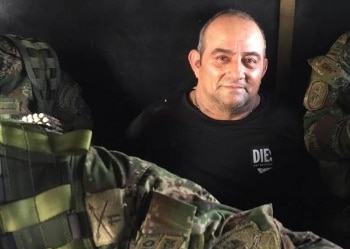Shortly after the capture of accused drug capo Dairo Antonio Úsuga, Colombia President Iván Duque announced that the country’s most-wanted trafficker would be sent to the United States to face charges.
Úsuga, alias “Otoniel,” has been on the radar of US prosecutors for more than a decade, and indictments are open against him in three US courts. While much of the information remains under seal, the accusations provide a glimpse of his climb in Colombia’s underworld – and show he was also one of the last men standing when it came to the group prosecutors called the “Urabeños.”
Úsuga was first indicted in 2009 on drug trafficking and terrorism conspiracy charges in the Southern District of New York. Prosecutors in the case alleged only that Úsuga and his brother, Juan de Dios Úsuga, alias “Giovanni,” had “provided logistical support and coordination for narcotics trafficking.”
SEE ALSO: What Does Otoniel’s Arrest Really Mean for Colombia?
That indictment was aimed mainly at Daniel Rendón Herrera, alias “Don Mario,” who ran finances for a bloc of the right-wing paramilitary umbrella group, the United Self-Defense Forces of Colombia (Autodefensas Unidas de Colombia – AUC). Later, Don Mario set up his own drug clan in the northeastern Colombia region of Urabá, from which the group takes its name.
The narcoterrorism charges stem from Don Mario’s time with the AUC, which the US State Department had designated a foreign terrorist organization. Prosecutors accused Don Mario of ordering the murders of rebel commanders, taxing drug traffickers to purchase weapons, killing police, and kidnapping civilians. Don Mario was captured in April 2009.
Six years later, Úsuga was indicted again in two separate US courts. In June 2015, he was charged with drug trafficking in the Southern District of Florida. A month later, he was indicted in the Eastern District of New York on criminal conspiracy, drug conspiracy, cocaine distribution, and murder conspiracy charges.
Prosecutors in New York were the first to name Otoniel, alongside Don Mario, as being the principal leader of the Urabeños trafficking organization. According to prosecutors, the group trafficked “multi-ton shipments of cocaine” to Central America and Mexico for importation into the United States. The group also coordinated the “production, purchase and transfer” of cocaine shipments while also taxing cocaine moving through areas under their control, prosecutors said.
SEE ALSO: Colombia News and Profile
The indictment details – during a nine-year span from 2003 to 2012 – some 30 cocaine shipments, ranging from 1,600 kilograms to 12 tons. The shipments add up to nearly 75 tons of cocaine.
Besides Otoniel, eleven other men were indicted in the 2015 cases. They included seven commanders who, according to prosecutors, collected drug taxes and managed combatants in territory under the group’s control. Charged were Roberto Vargas Gutiérrez, alias “Gavilan”; Jairo Durango Restrepo, alias “Guagua”; Carlos Antonio Moreno Tuberquia, alias “Nicolás”; Aristides Manuel Meza Páez, alias “El Indio”; Luis Orlando Padierna Peña, alias “Inglaterra,” Jobanis de Jesús Ávila Villadiego, alias “Chiquito Malo,” and César Daniel Anaya Martínez, alias “Tierra.”
Three other individuals were also indicted. Yony Alberto Grajales Álvarez, alias “ahijado,” headed a drug debt collection office in the city of Cali. Óscar David Pulgarín Gañán, alias “El señor de los caballos,” laundered money for the group, and Ramiro Caro Pineda, alias “Nolasco,” controlled airstrips on Colombia’s Atlantic Coast.
All three have since been arrested, and Pulgarín Gañán and Caro Pineda have pleaded guilty to their charges. Of the commanders, four have since been killed, and two have been arrested.
The only one who remains of the core group is Chiquito Malo, and he is possibly in line to take over the Urabeños after Otoniel’s capture.
Otoniel will also be following in the footsteps of several of his family members since his sister, two cousins and other more distant relatives have all been extradited to the United States due to their involvement with the Urabeños.

